Podcast: Play in new window | Download
Our guests on this week’s episode bring you two very different but equally important viewpoints of the massive endeavor that is video marketing.
Sahil Patel leads coverage of the video industry for Digiday, a leading modern media publication that is a go-to for tech nerds and marketing influencers. Patel was the launch editorial director of VideoInk, a business trade publication dedicated to the emerging online video entertainment industry. He has also covered TV and online video for Cynopsis Digital, and has appeared as a guest speaker at the New York Television Festival, VidCon, Social Media Week, and NPR’s “On the Media.” He joins the show to talk about video marketing from a broad, industry-wide perspective.
Jeremy Jacobowitz is the president and founder of Brunch Boys, a brunch-focused food media sensation boasting over 200,000 followers on Instagram, an increasing number of brunch-related events, and most importantly for this conversation, an expanding array of video projects. He was also named one of the most eligible bachelors in NYC by Guest of Guest. He joins the show to explain the boots-on-the-ground life of a social influencer making the most of video content in the food industry.
ABOUT THE SHOW
Like Bite & Share is a podcast about marketing in the food business. Each episode includes an insightful interview with food marketing professionals.
Key Takeaways:
- Video on Facebook is at the front and center of video marketing now. Mark Zuckerberg has said that Facebook is becoming a video-first company in a few years
- Live video broadcasting may seem new but it really began with companies like Periscope and Meerkat and are not seeing deep saturation because of Facebook
- Live video right now is primarily a good channel for brand awareness. You can monetize video content on YouTube, but on Facebook that isn’t available yet (though there has been some experimentation by Facebook)
- Facebook is once again reprioritizing their algorithm to give preference to your contacts over brand pages. Because of that, brand pages that use Facebook video will have to invest money in boosting those posts
- The bright side is that Facebook live has democratized video in a way. Even small restaurants with little to no budget no longer have to invest in expensive video production, because even the big players are doing no-budget live video broadcasts
- The optimal time for a pre-produced Facebook video is around 30-45 seconds. For a YouTube video, it’s 2-5 minutes. For Facebook live, it can be much longer
- A good Facebook video should have an eye-catching visual in the first 3 seconds so that people scrolling through their feed will want to stop
- Most Facebook users have their sound off, so closed captions or text of some kind is a good tactic to take
- Wochit and Wibbitz (linked below) are companies that help convert text-based video
- Facebook’s desire to have video succeed on their platform means they’ll push your video content to higher engagement. Use that desire on their part to your advantage
- Sunday nights tend to be the best nights to post Instagram video
Links Mentioned in this Episode:
- Wochit
- Wibbitz
- Amazon Video Direct
- Food Network expands its presence on Snapchat
- The Silent World of Facebook Video
- Amazon Introduces Video Content Uploading
- Facebook Video Aggregators are Winning
- Facebook Video Piracy Crackdown Means Ads are Coming
- Must Love Ice Cream
- Don’t Drink and Review
Learn more about Sahil Patel & Digiday:
Learn more about Jeremy Jacobowitz & Brunch Boys:
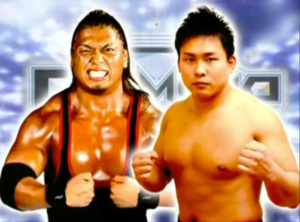 From Diamond Ring Kensuke Office Changes. They emphasize that Nakajima beat Dragon Gate wrestler Kenichiro Arai
From Diamond Ring Kensuke Office Changes. They emphasize that Nakajima beat Dragon Gate wrestler Kenichiro Arai  From Dynamite 131. This is a qualifying match for the Owen Hart Foundation tournament. Joe debuted at ROH Supercard of Honor, saving Jonathan Gresham from Jay Lethal (whose soul searching apparently led him to turn heel) & Sonjay Dutt after the main event. And now that ROH and AEW are the same thing, that seems worth mentioning. Caster’s pre-match rap was cute. This was real squashy, with Joe needing only two minutes to put Caster down with the Muscle Buster at 2:52. Lethal & Dutt pop up on the big screens and Lethal says he’d been trying to get a hold of Joe during his difficult soul searching time, and Joe never picked up. They have a present for Joe next week. N/A
From Dynamite 131. This is a qualifying match for the Owen Hart Foundation tournament. Joe debuted at ROH Supercard of Honor, saving Jonathan Gresham from Jay Lethal (whose soul searching apparently led him to turn heel) & Sonjay Dutt after the main event. And now that ROH and AEW are the same thing, that seems worth mentioning. Caster’s pre-match rap was cute. This was real squashy, with Joe needing only two minutes to put Caster down with the Muscle Buster at 2:52. Lethal & Dutt pop up on the big screens and Lethal says he’d been trying to get a hold of Joe during his difficult soul searching time, and Joe never picked up. They have a present for Joe next week. N/A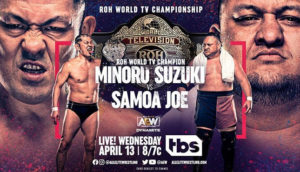 From Dynamite 132. Jay Lethal & Sonjay Dutt were in the front row cheering on Joe. Sarcastically, probably, as they brawled with Joe at ROH Supercard of Honor XV.
From Dynamite 132. Jay Lethal & Sonjay Dutt were in the front row cheering on Joe. Sarcastically, probably, as they brawled with Joe at ROH Supercard of Honor XV. 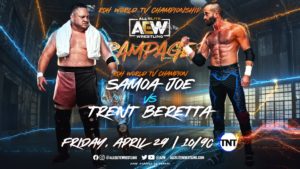 From Rampage 39.
From Rampage 39. 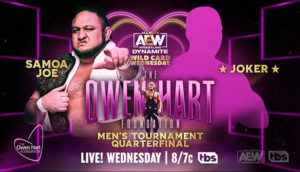 From Dynamite 137.
From Dynamite 137. 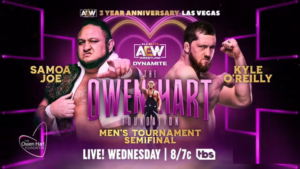 From Dynamite 138. This is a
From Dynamite 138. This is a 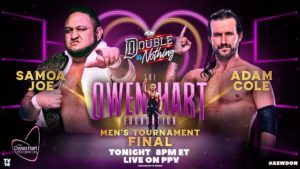 From Double or Nothing.
From Double or Nothing. 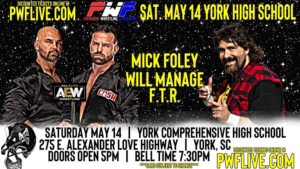 From PWF York Cougar Football Fundraiser. I didn't know that this match happened until over a month after the fact. This started out as a non-title match, but we'll get to why I've listed it as a title match in a moment. FTR have Mick Foley in their corner while their opponents have Bill Behrens. I’ve never actually seen Behrens do an on-camera gig before. He's holding a tennis racket, presumably as an Umaga to Jim Cornette. But it's confusing because there was actually a tennis player named Bill Behrens. They announce this match as having a 20-minute time limit. Only 11 minutes in, they say there are three minutes remaining. Until then, this was as run-of-the-mill as a modern FTR match gets. But the announcement snapped everyone out of their heat-on-Wheeler funk and forced them to go for desperate pins. They announce ten seconds remaining a couple of times, but no one can get the roll up pin they're looking for. The 20-minute time limit expires at 1
From PWF York Cougar Football Fundraiser. I didn't know that this match happened until over a month after the fact. This started out as a non-title match, but we'll get to why I've listed it as a title match in a moment. FTR have Mick Foley in their corner while their opponents have Bill Behrens. I’ve never actually seen Behrens do an on-camera gig before. He's holding a tennis racket, presumably as an Umaga to Jim Cornette. But it's confusing because there was actually a tennis player named Bill Behrens. They announce this match as having a 20-minute time limit. Only 11 minutes in, they say there are three minutes remaining. Until then, this was as run-of-the-mill as a modern FTR match gets. But the announcement snapped everyone out of their heat-on-Wheeler funk and forced them to go for desperate pins. They announce ten seconds remaining a couple of times, but no one can get the roll up pin they're looking for. The 20-minute time limit expires at 1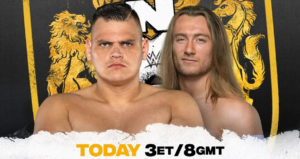 From NXT UK 183. McGuinness started by essentially saying that Fraser is going to pee or poo himself during the match. Unnecessary. Had Shawn Michaels been game to have a good match against Vader, this is what it would have looked like. Actually, a more appropriate and modern analogue is Brock Lesnar vs. Seth Rollins from SummerSlam. Much like that match, Frazer used quick strikes and avoided his larger opponent’s signature big move to stay alive. Here it was the powerbomb whereas there it was suplexes. Here, Frazer also successfully damaged WALTER’s knee, which slowed the big man down and made it hard for WALTER to hit the powerbomb. Unfortunately for Frazer, WALTER was able to bide his time and clothesline Frazer’s legs out from under him. An inevitable powerbomb followed and won the match for WALTER at 14:02. I hate to say this because I’m happy that he’s healthier, but the way WALTER has slimmed down has taken some of the magic away from his aura. At least for me it has. That said, dude can clearly still go as well as ever in the ring. ****
From NXT UK 183. McGuinness started by essentially saying that Fraser is going to pee or poo himself during the match. Unnecessary. Had Shawn Michaels been game to have a good match against Vader, this is what it would have looked like. Actually, a more appropriate and modern analogue is Brock Lesnar vs. Seth Rollins from SummerSlam. Much like that match, Frazer used quick strikes and avoided his larger opponent’s signature big move to stay alive. Here it was the powerbomb whereas there it was suplexes. Here, Frazer also successfully damaged WALTER’s knee, which slowed the big man down and made it hard for WALTER to hit the powerbomb. Unfortunately for Frazer, WALTER was able to bide his time and clothesline Frazer’s legs out from under him. An inevitable powerbomb followed and won the match for WALTER at 14:02. I hate to say this because I’m happy that he’s healthier, but the way WALTER has slimmed down has taken some of the magic away from his aura. At least for me it has. That said, dude can clearly still go as well as ever in the ring. ****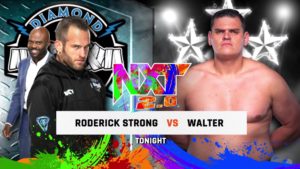 From NXT 659. Strong was feeling it here, which is thanks in large part to the crowd being maniacally loud from the get go I’m sure. His whole game was fast and devastating stick and move attacks. That worked pretty well, as WALTER was dazed from time to time. But as with all good WALTER matches (which is pretty much all WALTER matches), everything WALTER does is devastating here so it takes very little for him to take back control. And eventually he did just that and hit the powerbomb for the win at 9:46 (shown of 12:18). After the match, WALTER gets on the microphone and says that his name is Gunther now. I did not think WALTER would be a victim of the renaming curse this far into his run. What will they rename Strong?! ***¾
From NXT 659. Strong was feeling it here, which is thanks in large part to the crowd being maniacally loud from the get go I’m sure. His whole game was fast and devastating stick and move attacks. That worked pretty well, as WALTER was dazed from time to time. But as with all good WALTER matches (which is pretty much all WALTER matches), everything WALTER does is devastating here so it takes very little for him to take back control. And eventually he did just that and hit the powerbomb for the win at 9:46 (shown of 12:18). After the match, WALTER gets on the microphone and says that his name is Gunther now. I did not think WALTER would be a victim of the renaming curse this far into his run. What will they rename Strong?! ***¾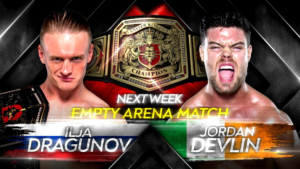 From NXT UK 185. Andy Shepherd helpfully announces from inside the ring that the reason for the stipulation is that the feud has gotten so violent that it wouldn’t be safe to have fans around. Devlin says during the match that it’s because he thinks Dragunov could only muster the energy to win if he had the crowd behind him. I like that explanation a lot more. The only real reason I could think of to do this without fans is that there was a scheduling conflict with one of the wrestlers for the regular TV taping date and they needed to get this thing filmed. We just had such a long stretch of empty arena NXT UK episodes that I can’t imagine anyone was dying to get another taste of it. This aired the day after Adam Cole vs. Orange Cassidy in a match that was also no disqualification and falls count anywhere, and this served up everything I felt was missing from that match. Now you might say, “Brad, Cassidy is not the same kind of character as Devlin or Dragunov, how could you expect the same level of violence or intensity?” To that I say, when Cassidy started his match by breaking his own sunglasses and rapidly punching Cole, he was indicating that level of violence and/or intensity. And instead the match was mostly wacky. Anyway, this was not wacky. It was stiff and intense and featured weapons that made sense and spots the didn’t take forever to set up. Dragunov got in trouble when his eye injury acted up. Devlin took control and beat the crap out of him. I wasn’t wild about how meek Dragunov was when Devlin was zip tying his hands, but I did like that in the end it turned out to be an error on Devlin’s part anyway because Dragunov’s finisher requires no hands. And indeed, a bound Dragunov jumped off the steel steps (which had been brought into the ring) and hit the Torpedo Moskau on Devlin for the win at 21:43. NXT UK is still sneaking in these dope matches that no one is watching. Y’all should watch them. ****¼
From NXT UK 185. Andy Shepherd helpfully announces from inside the ring that the reason for the stipulation is that the feud has gotten so violent that it wouldn’t be safe to have fans around. Devlin says during the match that it’s because he thinks Dragunov could only muster the energy to win if he had the crowd behind him. I like that explanation a lot more. The only real reason I could think of to do this without fans is that there was a scheduling conflict with one of the wrestlers for the regular TV taping date and they needed to get this thing filmed. We just had such a long stretch of empty arena NXT UK episodes that I can’t imagine anyone was dying to get another taste of it. This aired the day after Adam Cole vs. Orange Cassidy in a match that was also no disqualification and falls count anywhere, and this served up everything I felt was missing from that match. Now you might say, “Brad, Cassidy is not the same kind of character as Devlin or Dragunov, how could you expect the same level of violence or intensity?” To that I say, when Cassidy started his match by breaking his own sunglasses and rapidly punching Cole, he was indicating that level of violence and/or intensity. And instead the match was mostly wacky. Anyway, this was not wacky. It was stiff and intense and featured weapons that made sense and spots the didn’t take forever to set up. Dragunov got in trouble when his eye injury acted up. Devlin took control and beat the crap out of him. I wasn’t wild about how meek Dragunov was when Devlin was zip tying his hands, but I did like that in the end it turned out to be an error on Devlin’s part anyway because Dragunov’s finisher requires no hands. And indeed, a bound Dragunov jumped off the steel steps (which had been brought into the ring) and hit the Torpedo Moskau on Devlin for the win at 21:43. NXT UK is still sneaking in these dope matches that no one is watching. Y’all should watch them. ****¼ 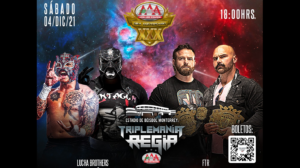 From AAA Triplemania Regia. FTR come out with Vickie Guerrero. This was supposed to be explained at an earlier AAA taping but FTR and Guerrero all missed them. AAA is notorious for having this kind of luck/being incompetent lately. FTR is also wearing Eddie Guerrero tribute tights, with American flags on one side and flames on the other, I suppose to pay homage to his Gringos Locos and Latino Heat gimmicks. This match mostly sucked, but one cool spot saw FTR tie Pentagon’s mask to the ropes and force him to unmask with his hands over his face to stop them from climbing the ladder. That would have been a very meaningful moment to lead up to the Lucha Brothers winning the titles back, but unfortunately instead it led into nothing. He just got his mask back and the match continued on in its lame, derivative way. At one point, Pentagon was the only man standing, but instead of climbing the ladder he grabbed a table from the floor. So the titles mean enough to him that he’d unmask to stop his opponents from winning, but not enough for him to get the titles when he had a clear path to do it? Vickie powered Pentagon, causing him to voluntarily jump through the table and Harwood grabbed the belts at 12:12. This was abysmal. *
From AAA Triplemania Regia. FTR come out with Vickie Guerrero. This was supposed to be explained at an earlier AAA taping but FTR and Guerrero all missed them. AAA is notorious for having this kind of luck/being incompetent lately. FTR is also wearing Eddie Guerrero tribute tights, with American flags on one side and flames on the other, I suppose to pay homage to his Gringos Locos and Latino Heat gimmicks. This match mostly sucked, but one cool spot saw FTR tie Pentagon’s mask to the ropes and force him to unmask with his hands over his face to stop them from climbing the ladder. That would have been a very meaningful moment to lead up to the Lucha Brothers winning the titles back, but unfortunately instead it led into nothing. He just got his mask back and the match continued on in its lame, derivative way. At one point, Pentagon was the only man standing, but instead of climbing the ladder he grabbed a table from the floor. So the titles mean enough to him that he’d unmask to stop his opponents from winning, but not enough for him to get the titles when he had a clear path to do it? Vickie powered Pentagon, causing him to voluntarily jump through the table and Harwood grabbed the belts at 12:12. This was abysmal. * From AEW Full Gear. Silver was hamming it up a lot more here than he was the year before in New York. That said, this had stronger just-a-match vibes than the aforementioned match. After Silver ripped out Cassidy’s pockets, Cassidy turned up the heat and these guys put on a middle of the row undercard match. Not bad by any means, but nothing memorable either. Cassidy hit the Beach Break rather out of nowhere for the win at 9:42. **¾
From AEW Full Gear. Silver was hamming it up a lot more here than he was the year before in New York. That said, this had stronger just-a-match vibes than the aforementioned match. After Silver ripped out Cassidy’s pockets, Cassidy turned up the heat and these guys put on a middle of the row undercard match. Not bad by any means, but nothing memorable either. Cassidy hit the Beach Break rather out of nowhere for the win at 9:42. **¾ 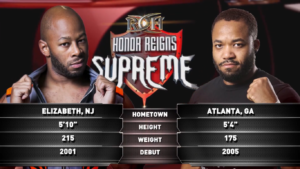 From the second Honor Reigns Supreme. The commentators sold this as Gresham getting a big shot against a top ROH guy after being an also-ran in the Television Championship division for a while. This was terrific. Both guys did a fantastic job selling their respective targeted limbs, and Gresham in particular played the role of the tenacious underdog perfectly. He didn’t just watch to see where Lethal would have trouble executing his finisher because of the damage he’d done to the former ROH Champion’s arm, he pressed the assault whenever he could, taking out the arm to make sure the Lethal Injection would never come. But what he couldn’t do was stop Lethal from battering his knee and ultimately winning with a Figure 4 Leglock at 17:54. ****¼
From the second Honor Reigns Supreme. The commentators sold this as Gresham getting a big shot against a top ROH guy after being an also-ran in the Television Championship division for a while. This was terrific. Both guys did a fantastic job selling their respective targeted limbs, and Gresham in particular played the role of the tenacious underdog perfectly. He didn’t just watch to see where Lethal would have trouble executing his finisher because of the damage he’d done to the former ROH Champion’s arm, he pressed the assault whenever he could, taking out the arm to make sure the Lethal Injection would never come. But what he couldn’t do was stop Lethal from battering his knee and ultimately winning with a Figure 4 Leglock at 17:54. ****¼ 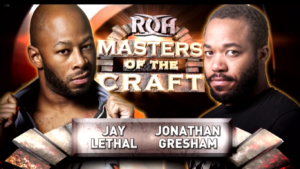 From the second Masters of the Craft. Columbus has way more Gresham fans than Concord did. That’s a neat little advancement to the plot, innit? They both went after the same limbs that earned them dividends in their previous match. And then they went ahead and built an incredible match out of that story. At first it seemed as though Lethal wasn’t going to be able to get Gresham’s leg to give out. But about halfway through the match, Gresham’s knee was in trouble. Gresham was able to escape the leglock this time by using the momentum of Lethal pulling him away from the ropes to shift to an armbar. But Gresham’s focus on the arm bit him in the ass. Lethal went for the Lethal Injection and collapsed again, but when Gresham went for a roll up after that Lethal cut back on it for the win at 18:27. This is one of the best American examples that I've seen of a match building on the match that came before. Rather than try to outdo the maneuvers from their first meeting for the sake of a big crowd reaction, they adjust their game plans in logical ways that, to me, were just as exciting. I think this match is slept on, by virtue of the fact that I’ve never heard anything about it before watching it. ****½
From the second Masters of the Craft. Columbus has way more Gresham fans than Concord did. That’s a neat little advancement to the plot, innit? They both went after the same limbs that earned them dividends in their previous match. And then they went ahead and built an incredible match out of that story. At first it seemed as though Lethal wasn’t going to be able to get Gresham’s leg to give out. But about halfway through the match, Gresham’s knee was in trouble. Gresham was able to escape the leglock this time by using the momentum of Lethal pulling him away from the ropes to shift to an armbar. But Gresham’s focus on the arm bit him in the ass. Lethal went for the Lethal Injection and collapsed again, but when Gresham went for a roll up after that Lethal cut back on it for the win at 18:27. This is one of the best American examples that I've seen of a match building on the match that came before. Rather than try to outdo the maneuvers from their first meeting for the sake of a big crowd reaction, they adjust their game plans in logical ways that, to me, were just as exciting. I think this match is slept on, by virtue of the fact that I’ve never heard anything about it before watching it. ****½ 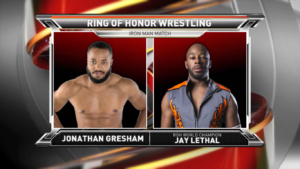 From ROH Wrestling 364. In real life,
From ROH Wrestling 364. In real life, 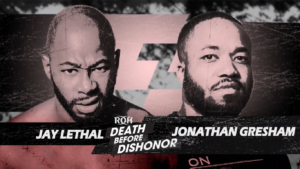 From Death Before Dishonor XVII. Gresham and Lethal had been teaming, but Gresham grew frustrated and started heeling. Ultimately, he turned on Lethal. It took them a little while to get there, but once they got into a groove this was exactly what I wanted from this match. It was back to their old tricks, with Lethal targeting the leg to set up for the Figure 4 Leglock and Gresham targeting the arm to block the Lethal Injection and set up for his Octopus. In the end, Lethal tried the cutback trick that worked for him in Columbus, but Gresham countered to a pin and then put on the gnarliest Octopus for his first win over Lethal at 17:20. This is the best kind of wrestling series. And none of it felt stale because it was a year after they’d wrestled last and because they found ways to energize the old tropes. And that’s not to mention Gresham busting out what I can only describe as a sumo-style assault. Gresham and Lethal make up after the match. ****
From Death Before Dishonor XVII. Gresham and Lethal had been teaming, but Gresham grew frustrated and started heeling. Ultimately, he turned on Lethal. It took them a little while to get there, but once they got into a groove this was exactly what I wanted from this match. It was back to their old tricks, with Lethal targeting the leg to set up for the Figure 4 Leglock and Gresham targeting the arm to block the Lethal Injection and set up for his Octopus. In the end, Lethal tried the cutback trick that worked for him in Columbus, but Gresham countered to a pin and then put on the gnarliest Octopus for his first win over Lethal at 17:20. This is the best kind of wrestling series. And none of it felt stale because it was a year after they’d wrestled last and because they found ways to energize the old tropes. And that’s not to mention Gresham busting out what I can only describe as a sumo-style assault. Gresham and Lethal make up after the match. ****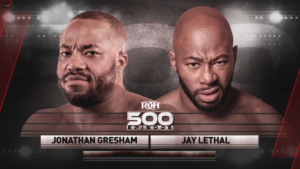 From ROH Wrestling 500. During the pandemic, ROH made the most of their empty arena shows by kicking them off with a tournament to crown a champion for the revived Pure Championship. Gresham won the tournament, and this was his fourth defense of the title. Lethal and Gresham were still allies here. In an interesting move, the other match on this milestone episode was two other partners fighting in Jay and Mark Briscoe. They cut to a commercial break about six minutes in, though the action didn’t get beyond (admittedly fast-moving) mat wrestling until the 10-minute mark. That had me thinking this was going to go long, but things took a different turn. Both guys had abused the other’s shoulders, and Lethal used that to his advantage best. He forced Gresham to use his first rope break to stop a pin, and his second to escape a crab. Then, he used the failed Lethal Injection to bait Gresham into a crossface, forcing the champ to use his final rope break. But he made the mistake of giving Gresham a breather and was quickly caught in a head scissor takedown giving Gresham the winning pin at 14:06 (shown of 16:40). For an empty arena match, this held my attention. It was totally different than their previous matches while still using a couple elements from the rivalry to elevate it just a bit. Not essential viewing, but if you’re working your way through their series you shouldn’t skip it. ***¼
From ROH Wrestling 500. During the pandemic, ROH made the most of their empty arena shows by kicking them off with a tournament to crown a champion for the revived Pure Championship. Gresham won the tournament, and this was his fourth defense of the title. Lethal and Gresham were still allies here. In an interesting move, the other match on this milestone episode was two other partners fighting in Jay and Mark Briscoe. They cut to a commercial break about six minutes in, though the action didn’t get beyond (admittedly fast-moving) mat wrestling until the 10-minute mark. That had me thinking this was going to go long, but things took a different turn. Both guys had abused the other’s shoulders, and Lethal used that to his advantage best. He forced Gresham to use his first rope break to stop a pin, and his second to escape a crab. Then, he used the failed Lethal Injection to bait Gresham into a crossface, forcing the champ to use his final rope break. But he made the mistake of giving Gresham a breather and was quickly caught in a head scissor takedown giving Gresham the winning pin at 14:06 (shown of 16:40). For an empty arena match, this held my attention. It was totally different than their previous matches while still using a couple elements from the rivalry to elevate it just a bit. Not essential viewing, but if you’re working your way through their series you shouldn’t skip it. ***¼ 


